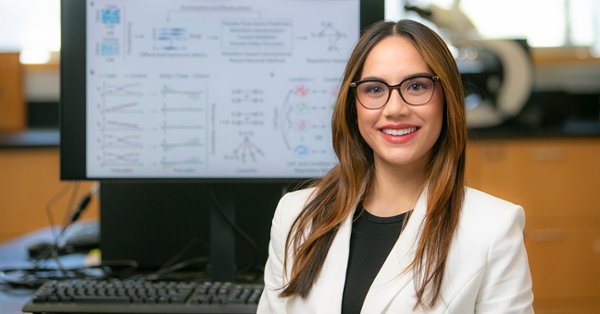Ph.D. student Madison Dautle receives prestigious NSF fellowship
Ph.D. student Madison Dautle receives prestigious NSF fellowship

Madison Dautle loves to analyze large data—many gigabytes of it.
Now, with funding from the National Science Foundation’s Graduate Research Fellowship Program (NSF-GRFP), the Rowan University doctoral student can devote more time to her work with Yong Chen, Ph.D., assistant professor of biological and biomedical sciences, as they develop deep-learning methods for better understanding the millions of simultaneous interactions made by a cell’s chromatin, the material within a cell’s nucleus made of RNA, DNA and protein.
“Data analysis has always been my favorite part of science,” said Dautle, who is pursuing her Ph.D. in complex biological systems. “With this award, I have much more time to do research work and outreach” including organizing a bioinformatics club, workshops and mentoring others in her program.
“It gives me a lot more flexibility to do what I want,” Dautle said.
The NSF program is the country’s oldest fellowship program directly supporting graduate students in the fields of science, technology, engineering and mathematics. Given in recognition of outstanding graduate students in NSF-supported disciplines, the prestigious, five-year fellowship provides an annual stipend for three years, along with financial support for tuition and fees, as well as access to professional development opportunities.
Dautle applied for the fellowship with guidance from Chen and Tabbetha Dobbins, dean of Rowan’s School of Graduate Studies and a professor of physics.
“This is a substantial fellowship, one that gives graduate students the freedom to focus on advancing their research,” said Dobbins, whose school offered a 12-week writing workshop last year to help graduate students apply for funding. “The program selects students who are expected to become experts in their field, contributing to research, teaching and innovations. Madison’s selection is a testament to the high-quality research programs we’ve established at Rowan.”
The Cherry Hill resident earned her bachelor’s and master’s degrees in bioinformatics at Rowan, where she works in Chen’s lab. With support from his 2023 NSF Faculty Early Career Development Program (CAREER) Award, Chen studies the interactions of chromatin, which regulates a cell’s essential processes, including DNA replication, DNA repair and gene expression.
One scientific method used to examine such chromatin interactions is called single-cell Hi-C, but researchers have been challenged by the poor quality of the resulting data. While the datasets are huge, the snapshots capture a small proportion of what’s happening at any given moment in a single cell. That’s why scientists call the resulting data “sparse.”
“Quantitatively, we don’t know how sparse it is,” said Chen. With Chen’s guidance, Dautle is building computational tools to better study these datasets to compensate for missing information gathered during such experiments.
Even though researchers have been challenged by the resulting data, single-cell Hi-C is still a valuable method, Chen said.
“Previously, we put millions of cells together to get to the signal,” Chen said. “Our cells have different types, different features, different behaviors. Their organization is different. We must understand them individually.
“Also, this is quite, quite valuable for neuroscience, because our neurons have individual functions. If you put many of them together, you miss the specific.”
Ultimately, understanding how and why chromatin works could point researchers toward understanding how cancer or other diseases develop at the molecular level.
“If you can understand the baseline,” Dautle said, “lots of other scientists can then come in and start looking at what is different? Why is this happening? And then you can start to make personalized medicines for these individuals. That’s really the goal.”